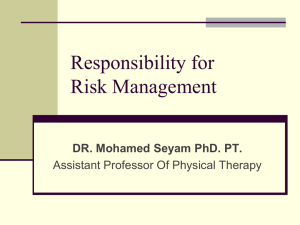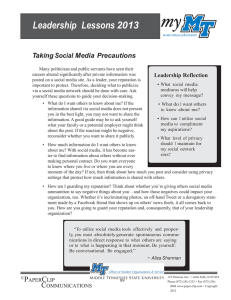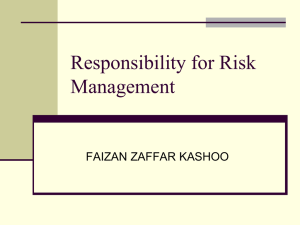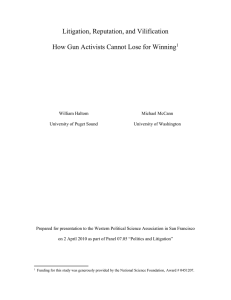This template aims at facilitating the identification of risks and...
advertisement
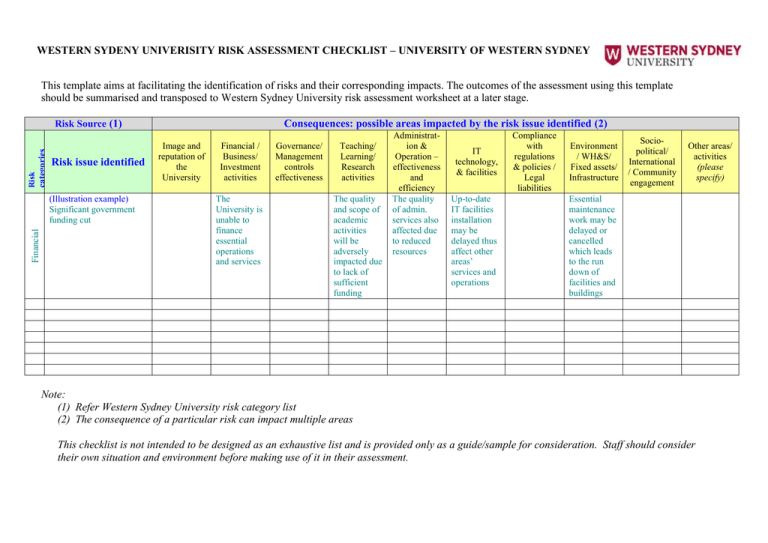
WESTERN SYDENY UNIVERISITY RISK ASSESSMENT CHECKLIST – UNIVERSITY OF WESTERN SYDNEY This template aims at facilitating the identification of risks and their corresponding impacts. The outcomes of the assessment using this template should be summarised and transposed to Western Sydney University risk assessment worksheet at a later stage. categories Risk Risk Source (1) Risk issue identified Financial (Illustration example) Significant government funding cut Consequences: possible areas impacted by the risk issue identified (2) Image and reputation of the University Financial / Business/ Investment activities The University is unable to finance essential operations and services Governance/ Management controls effectiveness Teaching/ Learning/ Research activities The quality and scope of academic activities will be adversely impacted due to lack of sufficient funding Administration & Operation – effectiveness and efficiency The quality of admin. services also affected due to reduced resources IT technology, & facilities Up-to-date IT facilities installation may be delayed thus affect other areas’ services and operations Compliance with regulations & policies / Legal liabilities Environment / WH&S/ Fixed assets/ Infrastructure Sociopolitical/ International / Community engagement Other areas/ activities (please specify) Essential maintenance work may be delayed or cancelled which leads to the run down of facilities and buildings Note: (1) Refer Western Sydney University risk category list (2) The consequence of a particular risk can impact multiple areas This checklist is not intended to be designed as an exhaustive list and is provided only as a guide/sample for consideration. Staff should consider their own situation and environment before making use of it in their assessment. WESTERN SYDNEY UNIVERSITY RISK CATEGORY LIST Category Academic (Course load/ logistics) Academic (Course curriculum/ quality) Description Low Student load by course and campus, Staff student ratios, teaching Poor staff/ student ratios in some programs. loads, admission processes and standards, student progression and retention rates, mode of delivery, changes of student profile and market demands, course and unit coordination capacity and load of academics, levels of administrative and technical support for academic activities Quality/ standard of academic program/ course contents, planning Prolong course approval process that delay strategy for course offerings, approvals and monitoring process for the marketing or offer of new courses courses and units High Major decline in student progression rates and serious incident of academic misdemeanor – the University reputation/ enrolments suffer Programs/ courses loss industrial/ professional accreditation or special funding from authorities Academic (Research) Research income, research load, research work and staff, research capacity, intellectual property, patents, ethical conduct in research etc. Poor research student ratios in some educational programs Dispute in IP Major decline in research projects and research income – poor ERA rating that impacts the University reputation. Outcomes of major research program not protected and “lost” Behaviour Staff attitudes to risk, risk culture: staff reckless (disasters), staff conservative (opportunities lost), staff uptake of policies Staff occasionally take uninformed risks, staff are only sometimes too conservative Staff reckless – disasters; staff conservative – opportunities lost Environmental Water, soil, air contamination, asbestos, waste management, incidents causing damages, injury/ death, environmentally triggered emergencies (Work Health & Safety risks) Reductions in income, liquidity, financial loss, insurances, debt, budget overruns, tenders Slips, trips and falls – minor WHS issues Major hazards, pollution, asbestos, injury or death Impact less than say $10,000, manageable Impact exceeding say over $2m, significant impact on budget Financial Infrastructure International Legal Legislation Organisational Political Reputation (local & International) Technology The physical fabric of the University, buildings, roads, pathways, Burst water creating disruption lasting several hours utilities (electricity, water) Overseas ventures/ reputation/ program disaster, relationships Relationship with overseas university broken with overseas universities Major fires destroying many buildings – academic activities disrupted for a considerable period. Contracts and agreements, high profile litigation - financial and Some chance of litigation, insured reputational impact Breach, financial penalty/ impact on reputation, laws, regulations, Minor breach – minor penalty codes, affecting the University High profile litigation, major financial impact Overseas reputation disaster, several programs collapse Major breach, financial penalty and impact on reputation Strength of policies and procedures, planning, staffing, morale, training, ethical culture, leadership and management Ability to respond to major changes in education policies, level of government consultation Staff lacking some skills; weaknesses in some admin. processing systems Unethical culture, high staff turnover, no plans, very poor systems Some change but highly consultative Major change in government and policies on education Damaging media reports, employability of graduates, research links, regional involvement Brief mention in paper Full article in press, front page, ICAC report Strategic direction of IT, reliance on ecommerce/ email/ internet, Network down for 1 day student records system, library, university systems Student records system broken and data not be recovered, Student blended learning environment portal is down for more than one week SIMPLE GUIDELINES TO USE THE ASSESSMENT CHECKLIST If we think of risk as an event or an issue or development that could stop or impede your unit/operations from achieving its objectives, what are the risks that concern you the most and what are the possible cause and consequence if these events occur to your unit or the University? (e.g. Too many inexperience casual staff in the University may affect the quality of services to students/staff etc) 1. Risk issues raised must have a situation/condition (cause) and a corresponding (impact) to you/ your organisation/unit/operation. 2. Use the checklist provided to identify what areas/activities of the University has been/ will be impacted and briefly and duly describe what the consequences are (please refer to the example provided). 3. These Risk issues and events form the basis for assessment and evaluation.
